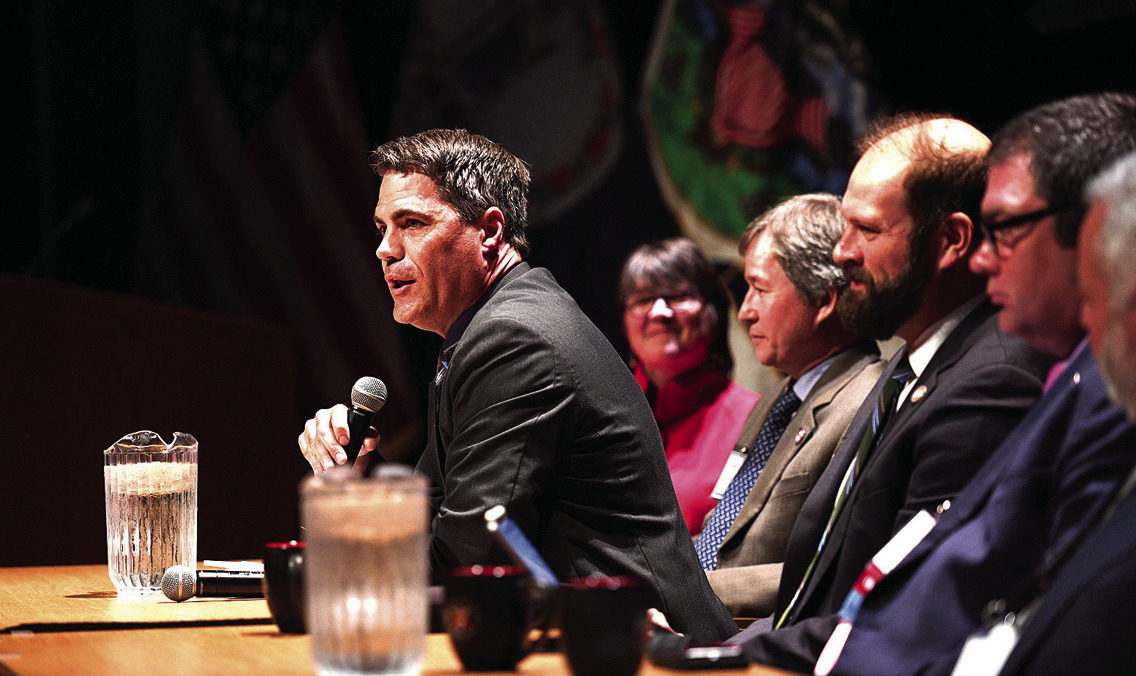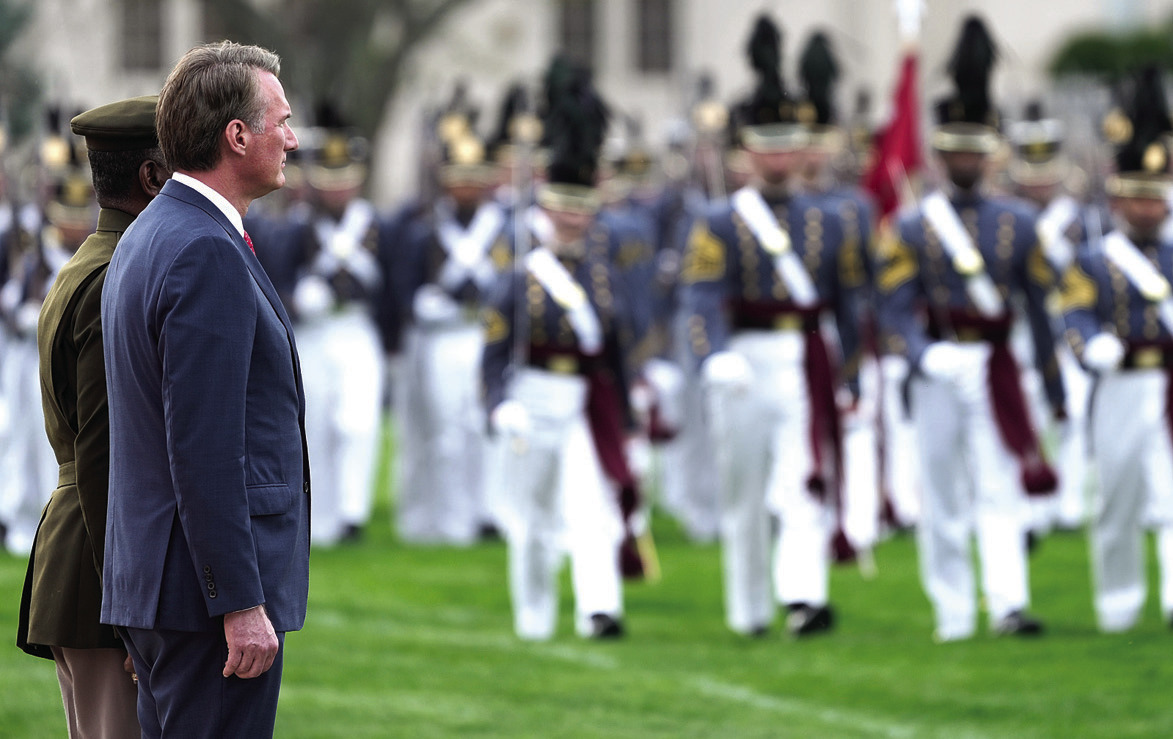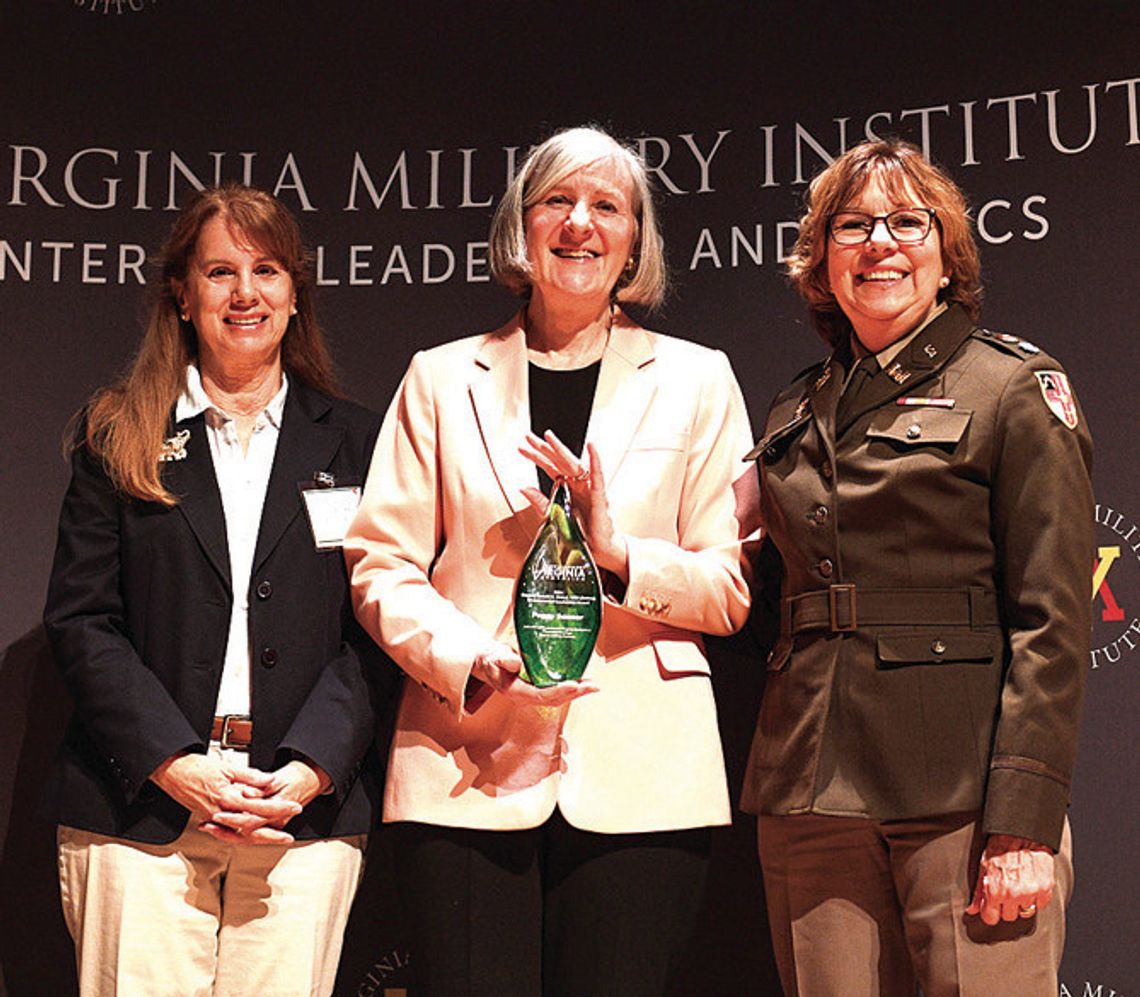Governor Keynote Speaker At Environmental Conference At VMI
Virginia Gov. Glenn Youngkin touted the environmentrelated accomplishments of his administration during his keynote address at the 34th annual Environment Virginia Symposium at Virginia Military Institute last week.
The three-day event, organized and co-hosted by the Center for Leadership & Ethics (CLE), attracted 550 attendees from state and local governments, nonprofit organizations, higher education, and the private sector.
In his address Wednesday evening, Youngkin reported on multiple achievements among state agencies.
The DEQ, he said, has improved agency permitting process time by 40%; the DWR has made the outdoors more accessible by opening more than 30,000 acres of public and private lands for outdoor recreation, and was named State Fish and Wildlife Agency of the Year by the Congressional Sportsman Foundation; $2.4 million was spent to support tree planting efforts across the commonwealth; and civic communities, local governments, tribal organizations, nonprofit organizations, neighborhood associations public educational institutions, state agencies and volunteer groups were all engaged on over 100 projects.
He stated that the Chesapeake Bay holds a very important part of his attention, and continues to be a priority.
Speaking of other accomplishments of his administration, he said, “From the coast to the mountains, we have awarded nearly $120 million in funding to help communities address flood resiliency through the Community Flood Preparedness Fund. We also launched the Resilient Virginia Revolving Fund to help provide nonfederal matching for federal resilient grants. It’s amazing what we can achieve when we work together and take ideas and turn them into actions.”
Youngkin said that economic development and preserving nature is not an either/or situation, but rather a both/and moment.
“We can use our natural resources to further benefit Virginia economically, all while doing so transparently,” he said.
He concluded by expressing his appreciation to those assembled. “I can go on and on about the incredible progress that has been in motion over the past year, as I just barely touched the surface. Clearly there is a lot ahead of us. If I could express one simple sentiment to all of you tonight, it is thank you for your commitment, your passion, and your love of this work, for protecting Virginia so that future generations might come to enjoy it, and for instilling in them the importance of stewardship of our blessings, and to pass them on to the next generations.” -Col. Dave Gray, director of the CLE, served as master of ceremony for the conference.
According to Justin Spears, conference operations coordinator for the CLE, a conference app was fully implemented this year to aid and enhance the symposium experience for those in attendance.
“I’m pleased that 320 attendees downloaded the app,” he said. “We tested it and used it partially last year, but this year we are using it to its fullest capacity. We are able to communicate information on event scheduling, speakers, exhibitors, sponsors, and hotel shuttle information. We can even send out push notifications for announcements. It has been tremendously useful.”
Topics discussed at this year’s breakout sessions included the wetlands, community flood preparedness, the benefits of oysters, safe wildlife corridors, climate resilience, solar power, septic solutions, urban and suburban landscaping, transportation planning, working with sovereign tribes and underserved communities, combating invasive fish and plants, and the health of the Chesapeake Bay. -The agency directors panel was moderated by Bettina Ring, Virginia director of The Nature Conservancy, and featured five state government officials from the conference’s cohosting agencies: Matthew Wells, director of the Department of Conservation and Recreation (DCR); Mike Rolband, director of the Department of Environmental Quality (DEQ); Ryan Brown, executive director of the Department of Wildlife Resources (DWR); Jamie Green, commissioner of the Virginia Marine Resources Commission (VMRC), and Rob Farrell, director of the Department of Forestry (DoF).
Wells, who became DCR director in March 2022, said he wants to expand access to outdoor recreation, open new parks, provide additional park amenities, and ensure the parks are safe and well maintained. Improving water quality in the Chesapeake Bay and mitigating high-risk dams are high-priority projects for his department. He is also striving to be as inclusive as possible to all groups.
“We seek a diversity of opinions. We have recently hired a director of cultural resources, who has done a great job reaching out to the Tribal Nations,” he stated. He added that 60% of flood funds go to low-income areas, and that the parks department has ongoing educational programs to teach families about nature and how to fully enjoy the outdoors.
Rolband good-naturedly shared that most people do not like regulators, which is his primary job. “The DEQ regulates land, air, and water. I think it’s really fun and interesting,” he said. “We have the cleanest air, the cleanest water, and the cleanest land that I have seen in my entire adult life. If you look at all the statistics, the reason our citizens can hunt and fish is because the regulatory programs have worked in Virginia. We have resources that are unsurpassed since the 1970s. Back then if you swam in the Potomac River, there was a chance you would get seriously sick, but now the water is amazing. You can go fishing there, and thoroughly enjoy it.”
Brown, who is an avid hunter, angler and outdoorsman, has overseen significant improvements in the DWR’s law enforcement division during his five-year tenure. He developed the commonwealth’s first modern elk hunt, and has undertaken significant conservation initiatives.
Farrell serves as the eighth state forester of Virginia as well as the director of the DoF, which is responsible for protecting the forest resources of Virginia. Farrell echoed his favorite mantra from previous years’ conferences: “Trees are the answer. Whatever the problem is, trees are the solution.”
He emphasized the importance of planting trees and building community support for trees and community understanding of the benefits of trees.
Green, who was appointed to his current position in 2022, started his career at the VMRC in 2005 as a law enforcement officer.
“Forty years ago, oysters were on the brink of extinction because of parasites,” said Green. “Now the population is extremely healthy. Building oyster reef habitats improves water quality, and is the equivalent of planting trees for air quality. Oyster reefs attract more wading birds, more fish, shrimp, and seahorses. It is a huge economic benefit for recreational fishing.”
-A meaningful part of the annual symposium is the announcement of the winner of the Erchul Environmental Leadership Award.
This year’s winner is Margaret L. “Peggy” Sanner, former Virginia executive director of the Chesapeake Bay Foundation (CBF). The award recognizes a Virginian who has made significant individual efforts to improve the environment. The award is named for the late VMI professor Capt. Ronald A. Erchul, Ph.D., founder of the Environment Virginia Symposium.
Sanner retired last August after a successful career with the CBF focused on environmental law and policy. She played a pivotal role in advancing legislative and regulatory environmental policies, including fencing cattle out of streams, banning phosphorus from lawn fertilizer, establishing a comprehensive nutrient trading program, and expanding tree cover. She has also been a leading advocate in the development and maturation of Virginia’s clean water regulatory programs, including improving and protecting wetland preservation and mitigation policies, advocating for effective implementation and enforcement of the Chesapeake Bay Preservation Act, and ensuring stormwater, erosion and sediment control programs are backed by science.
Each year, Virginia Military Institute donates $1,500 to a nonprofit environmental organization of the recipient’s choice in their honor. Sanner has requested this donation be made to the Virginia office of the Chesapeake Bay Foundation.
Other awards presented at the symposium are the Governor’s Environmental Excellence Awards, which recognize successful and innovative efforts that improve Virginia’s environment.
This year’s gold medal winners are Cabinetworks Group, a Shenandoah Valley facility which implemented a solvent reclamation program; Church & Dwight Co. Inc., which worked for nearly a decade to modify the manufacturing process of certain personal hygiene products, reducing the use of hundreds of thousands of pounds of ammonia and phosphorus products while reducing production costs by 65%; MYR Energy Services Inc., DESRI and Nevados, project partners who reduced the amount of land grading needed to install the Bartonsville Energy Facility, a solar installation, at the foot of the Appalachian Mountains in Frederick County; Patrick Henry Memorial Foundation, Ward Burton Wildlife Foundation, and Virginia Outdoors Foundation, for a 600-acre easement placed on Red Hill, the home of Patrick Henry; and RTX-Raytheon Sustainability, a major business unit within RTX, which has exemplified RTX’s corporate sustainability through a broad range of projects that reduced the business unit’s environmental impacts, including reductions in water use, waste generation and air pollutant emissions.
Silver and bronze medal awards were also handed out.
Editor’s note: This story was taken from a piece written for VMI by Marianne Hause, media relations specialist for VMI Communications and Marketing.


AT LEFT, Gov. Glenn Youngkin and Maj. Gen. Cedric T. Wins ‘85 take review of the corps of cadets during a parade in the governor’s honor last Wednesday. BELOW LEFT, Margaret L. “Peggy” Sanner (center) accepts the Erchul Environmental Leadership Award. BELOW, Ryan Brown, executive director of the Department of Wildlife Resources, addresses the assembly during the agency directors panel. (VMI photos by H. Lockwood McLaughlin)
.jpg)


